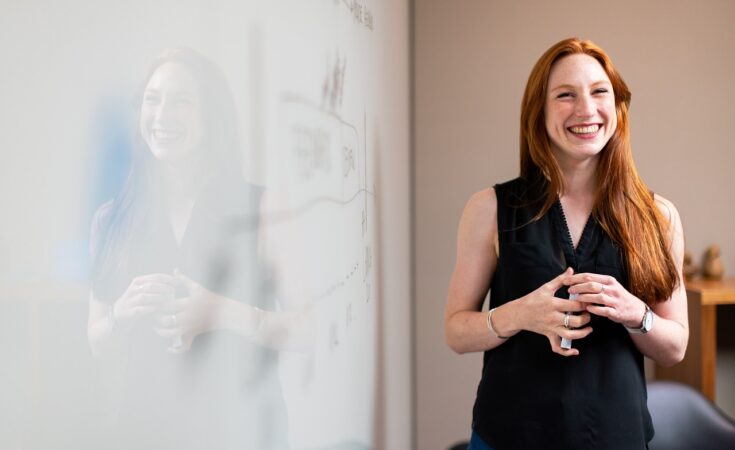In today’s society, the quest for status has become almost synonymous with the pursuit of happiness. We often equate our worth with the roles and titles we carry, believing that these labels will provide us with the validation we seek. But what if this very quest for status is the problem?
After 24 years of experience as a freelance and then a therapist, it has become increasingly clear to me that the pursuit of a status to reassure ourselves and fit in with societal expectations is a profound mistake.
Yes. There’s no doubt: the pursuit of a status to reassure ourselves and fit in with societal expectations is a profound mistake. Let me explain…
For many mothers who don’t work in traditional salaried positions, the pressure to define oneself through a title or role can be immense. The societal narrative often suggests that in order to be valued, one must have a clearly defined status—be it a job title, a professional achievement, or a label that fits neatly into a conversation. However, this mindset overlooks the deeper, more human aspects of our existence, especially for those who have chosen to step away from conventional career paths. It seems to me, however, that this is even more true in France than in the USA.
The modern obsession with status can be understood through the lens of social comparison theory.
The modern obsession with status can be understood through the lens of social comparison theory. This psychological concept suggests that we constantly evaluate ourselves against others to determine our self-worth. Of course, this is more true for some people than for others. Here, I really notice the presence of young employees who judge others exclusively based on their appearance, status, and how much they earn. Yes, in France, there is this habit of wanting everyone to fit into a specific box, to know the amount of your salary in order to judge you based on your income and possessions. This may seem shocking, but it’s especially difficult to live with. For example, I’ve been self-employed for 25 years, yet people always ask if my profession is my original career or a career change (in France, career changes are often devalued compared to the original career) and whether I’m doing well or not. I also notice a certain disdain and jealousy. If I explain that I chose this lifestyle to take care of my children, pursue my various artistic activities, and focus on my health, people smile. Here, to be considered valid and accepted, you must be an employee and work hard. In Germany, it’s very different; status matters less. And in the USA, when I tell people what I do with my days, they’re very positive and simply say, “Wow, congrats!”
In doing so, searching for a valuable status, we may feel compelled to adopt a status that aligns with societal norms, even if it doesn’t resonate with our true selves. But this comparison is a double-edged sword. While it might offer temporary reassurance, it ultimately detracts from our ability to find fulfillment in the roles we naturally inhabit—such as being a mother, a caregiver, or simply a person dedicated to personal growth.
True happiness and fulfillment arise from engaging in activities that are meaningful to us, rather than those that are socially validated.
Another relevant concept is self-determination theory, which emphasizes the importance of autonomy, competence, and relatedness in achieving true well-being. When we chase after a status that isn’t genuinely aligned with our values, we sacrifice our autonomy and compromise our ability to live authentically. True happiness and fulfillment arise from engaging in activities that are meaningful to us, rather than those that are socially validated.
As a mother, choosing to live without a conventional status can be an empowering decision. It allows you to reclaim your time, energy, and focus for pursuits that are often more human and rewarding. Whether it’s nurturing your children, volunteering in your community, or exploring creative endeavors, these activities offer a deeper sense of purpose than merely contributing to the bottom line of an enterprise. The satisfaction that comes from these pursuits is intrinsic, not dependent on external validation or the approval of others.
The journey of becoming a freelancer in 1999, after a whirlwind marriage and divorce at the age of 23, was not easy. There were many moments of doubt. I transitioned from a relational communication consultant to a chief editor before taking 13 months of studies to become a therapist—I was already working in hospitals. It was chaotic at times. My loved ones took a while to accept my decision. I’m not talking about my immediate family, but more about my extended family—like aunts, cousins, and so on. Everyone would say, “When will you find a real job in a company, sitting behind a desk?” Meanwhile, I was working on client projects from the beach in Malta, Greece, or on the train, plane, etc. And it really bothered them. Then I realized: I was making them uncomfortable because I was happy without having that famous status that was so important in their eyes! I faced a lot of hostility! But fortunately, I also experienced kindness from those who mattered most. Today, I’m grateful for having traveled the world, spending as much time as possible with my children, writing and publishing my own books, being invited to exhibit my paintings, producing my songs, and seeing clients in my practice. On average, I work at my practice three hours a day, and the rest of my time is dedicated to my artistic activities and my children’s upbringing. I have 13 weeks of vacation per year… and still no defined status according to some. Laughs! I’m approaching 50 with peace of mind and in good physical shape. Body and mind balance!
Moreover, the notion of mindfulness—being present in the moment and fully engaged in whatever you’re doing—becomes more accessible when you’re not preoccupied with chasing a status. This mindful approach to life enables you to appreciate the small, everyday moments that truly enrich your life and the lives of those around you.
In our rapidly changing world, the traditional markers of status are losing their relevance. The idea that a job title or societal role can serve as a reliable source of happiness is increasingly being questioned. Instead, the focus is shifting towards more sustainable forms of well-being—those that are rooted in self-acceptance, meaningful connections, and the freedom to live according to one’s values.
So, to all the mothers out there who may feel pressured to define themselves by a status, I offer this perspective: Embrace the freedom that comes from living without a label. Celebrate the fact that you have the time and space to pursue goals that are more aligned with your true self. The quest for status is a pursuit that can never truly satisfy. Instead, find pride in living a life that is authentically yours, filled with human connections and a sense of purpose that no external label can ever match.


































